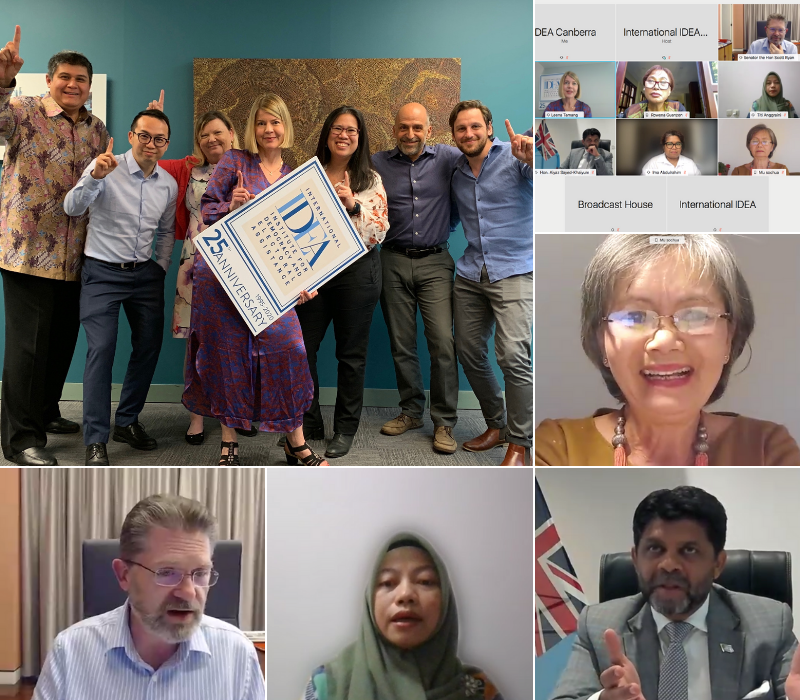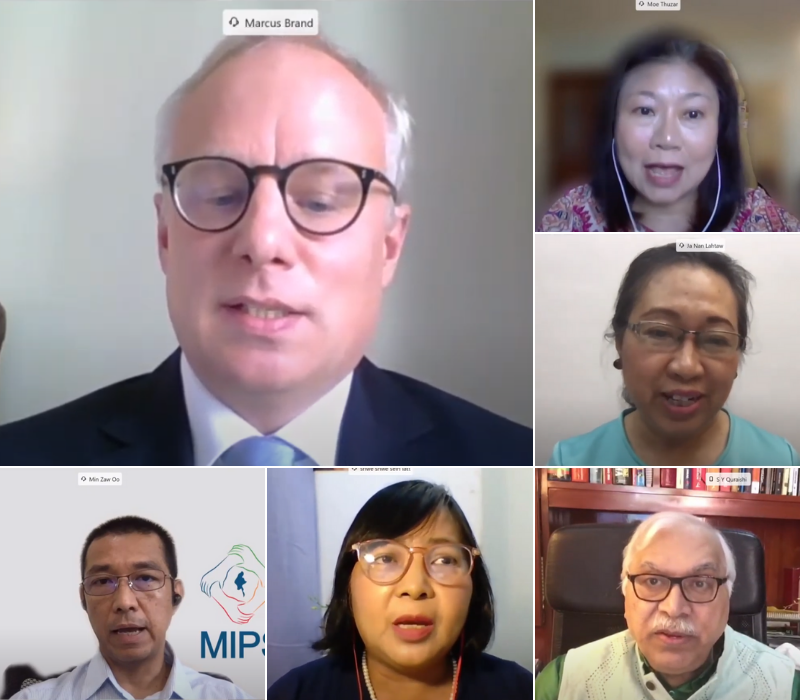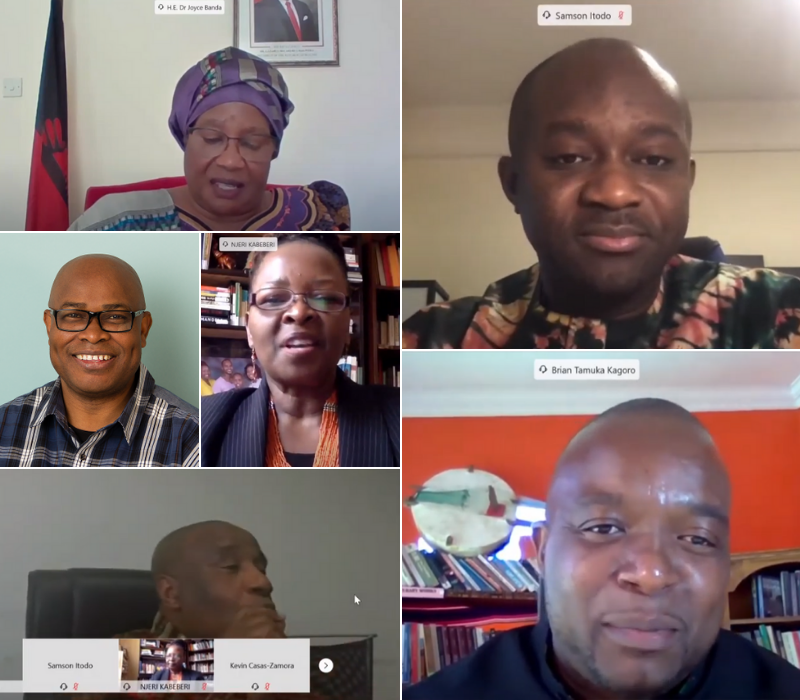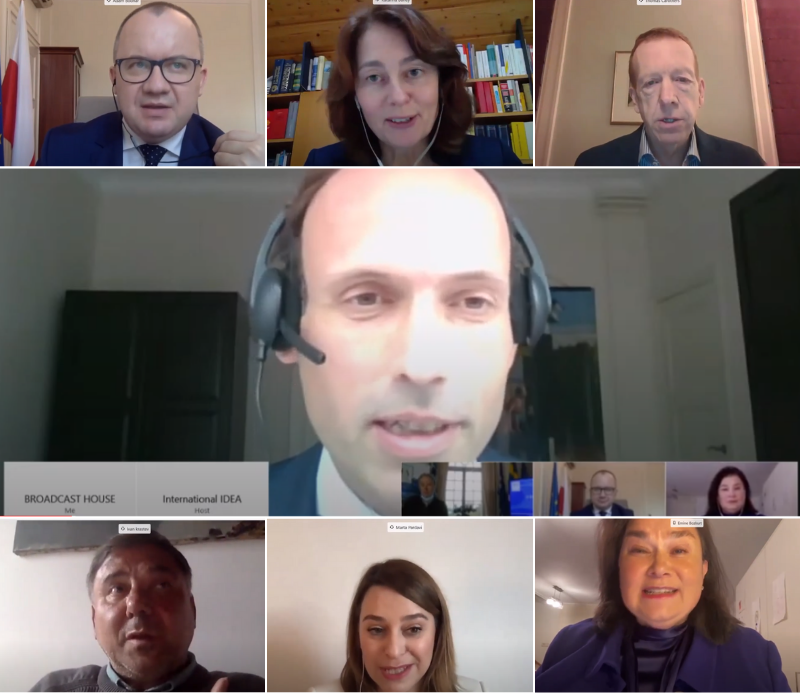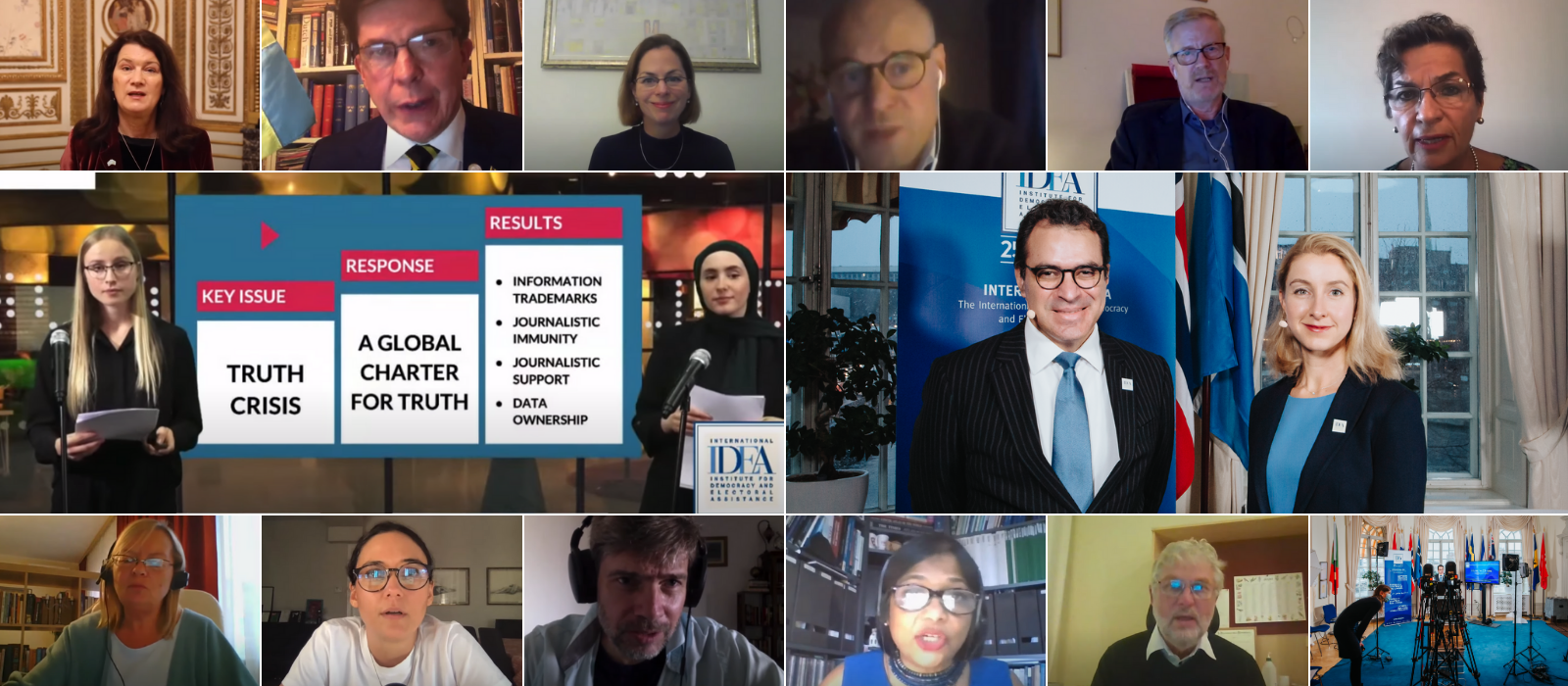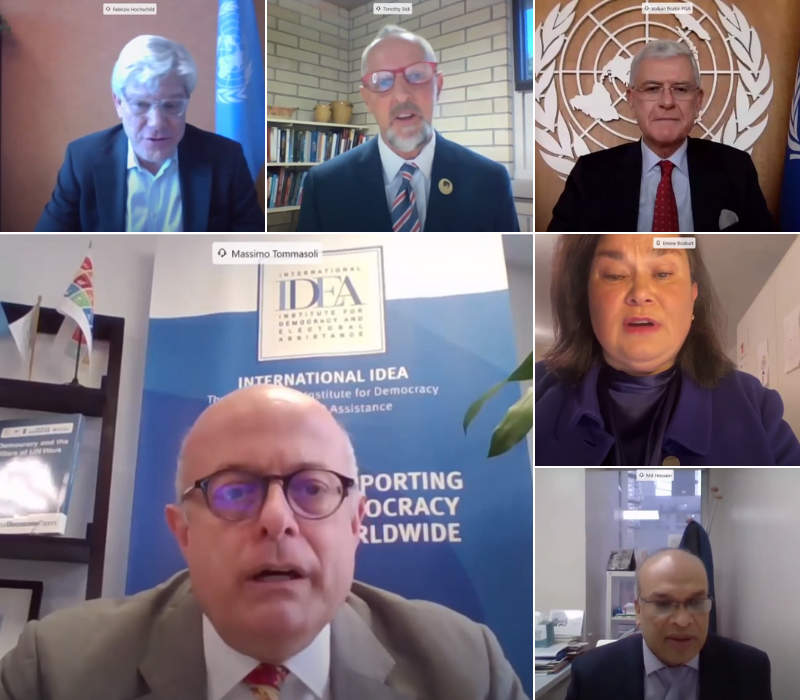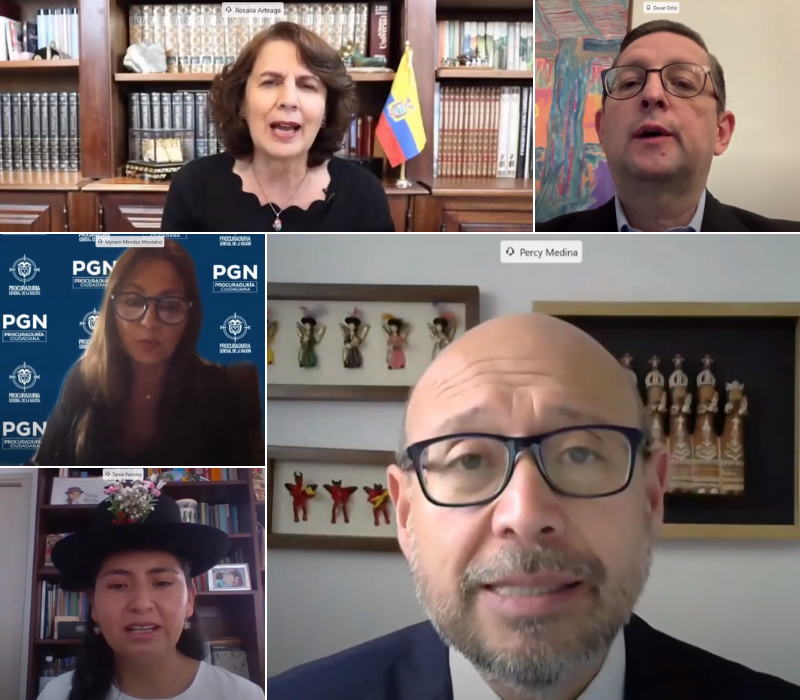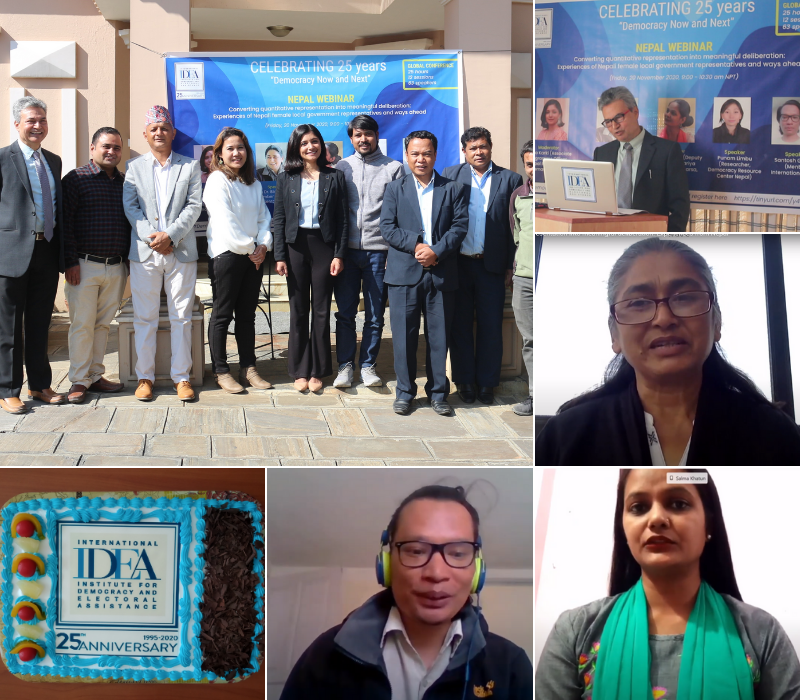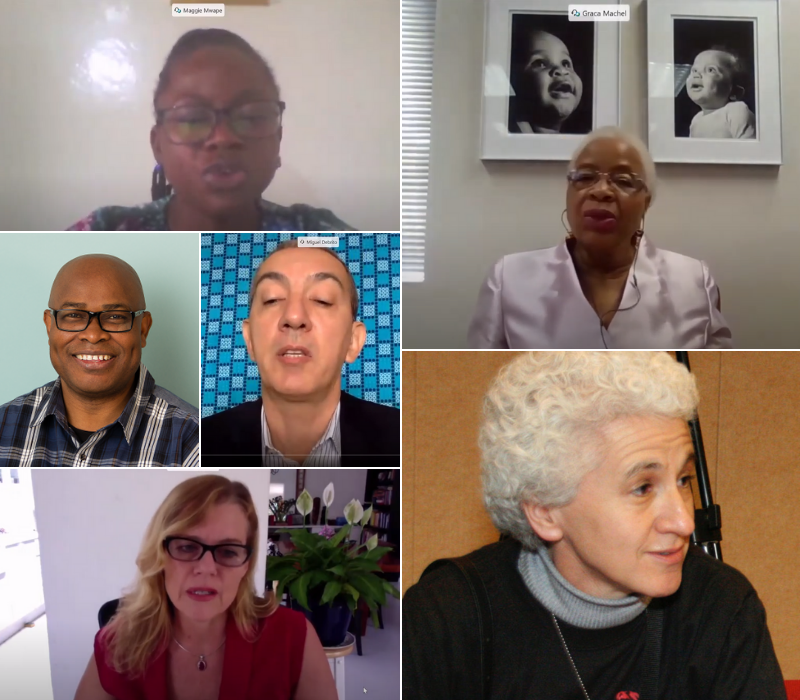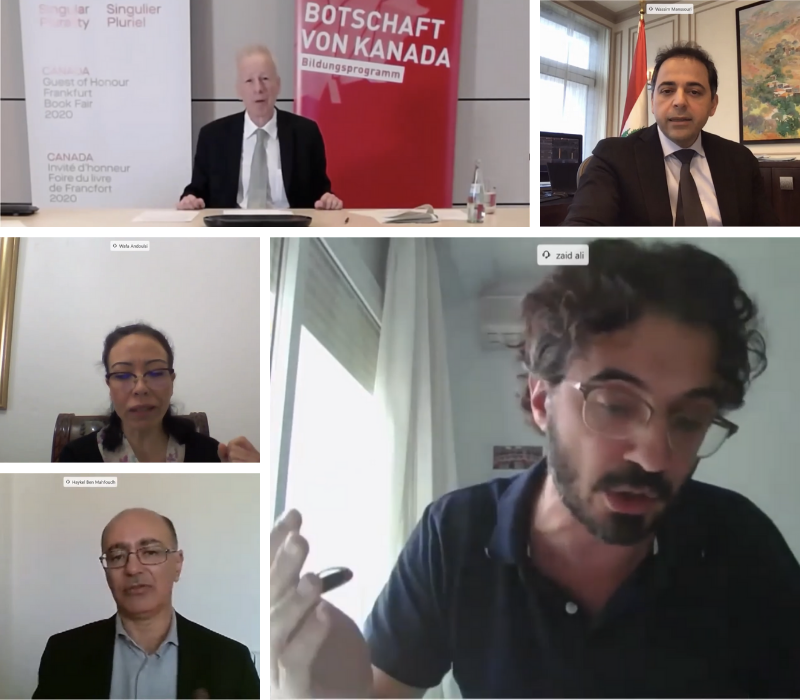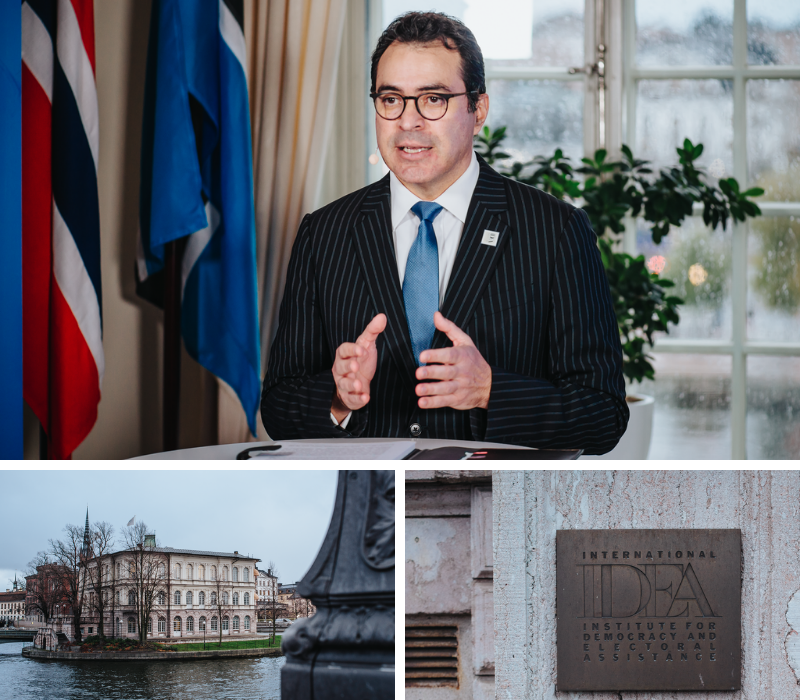Highlights from International IDEA´s 25th Anniversary Global Conference
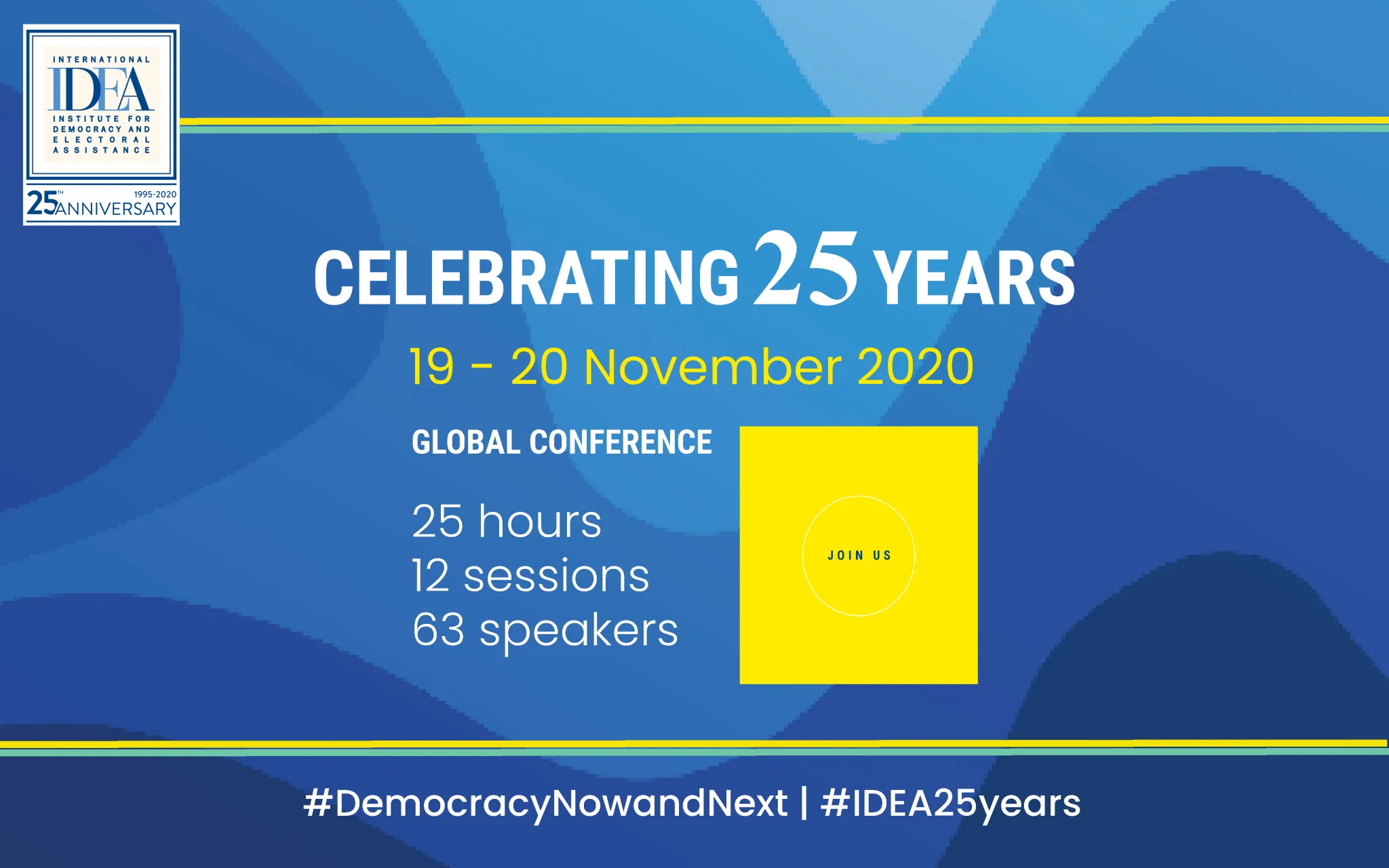
International IDEA celebrated its 25th Anniversary on the 19-20 of November through a 25-hour conference, "Democracy Now and Next." During the meeting, the Institute showcased its thematic expertise through 12 sessions and 63 speakers organized by our regional and country offices. The conference generated a global conversation about the future of democracy and the role of International IDEA.
Different topics were addressed, such as the future of elections, democracy development, inclusive participation and representation, electoral justice and democracy and climate change. Almost 2,000 participants worldwide joined during the streaming. The session recordings are available now on YouTube and have registered more than 5,500 thousand visualizations less than a week after its release. This virtual event's success was possible thanks to International IDEA's 33 Member States, former secretaries-general, board members, partners, friends, and International IDEA dedicated staff.
Now the Institute is moving forward "by starting a new stream on democracy and climate change and by making sure that democracy is not only defended but reform and revitalized," as Dr Kevin Casas-Zamora, International IDEA's Secretary-General mentioned during the closing remarks.
25th anniversary site
For the 25th Anniversary conference, a special website is available: https://www.idea.int/25years/ where you can find specific campaigns like the Evolution of Paper Ballot Exhibition; the video on democracy by the International Youth Think Tank, and the Institute's timeline with a selection of milestones in the past 25 years.
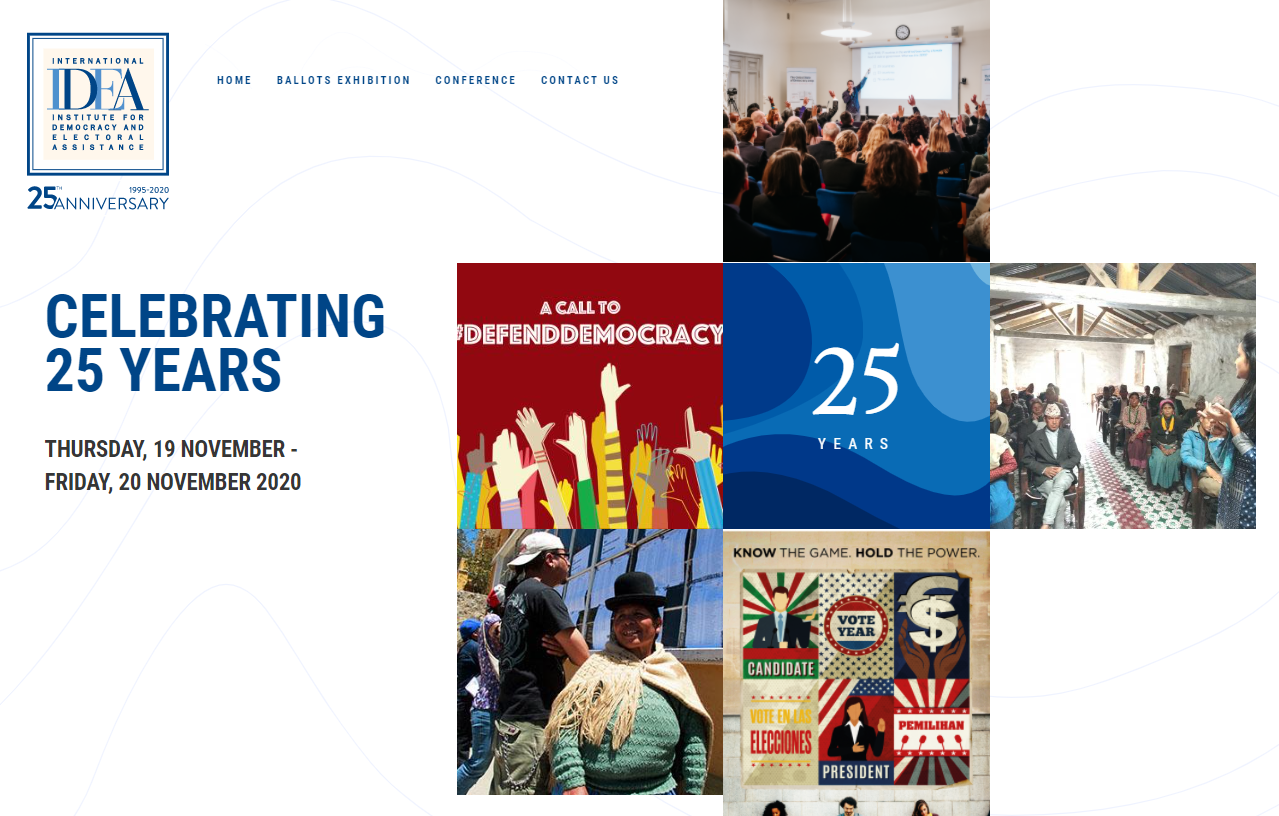
63 SPEAKERS participateD in the 25th anniversary conference
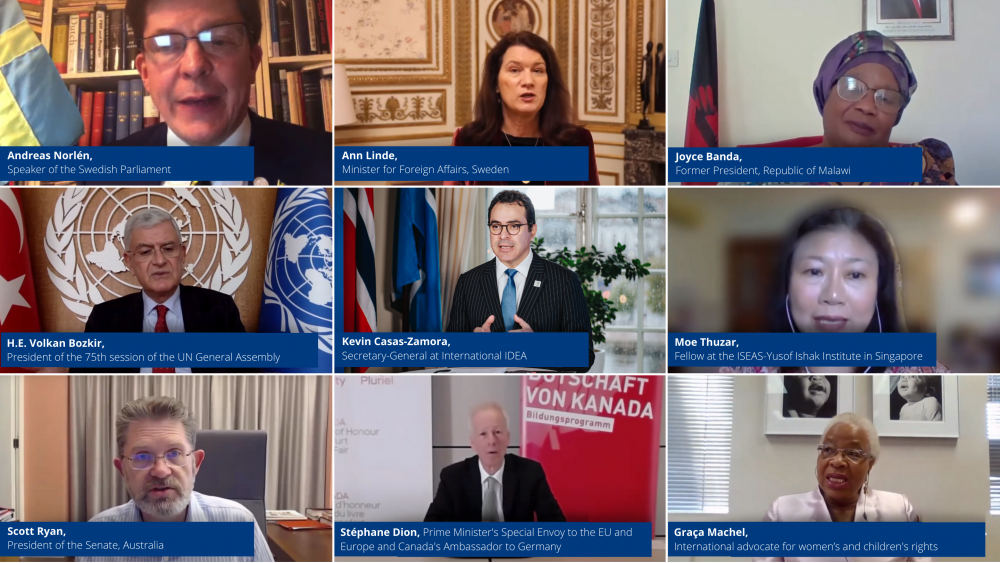
The conference brought together 63 speakers from around the world. International IDEA gathered figures with experience and outstanding recognition in their areas of expertise, to mention a few:
- Andreas Norlén, Speaker of the Swedish Parliament
- Ann Linde, Minister for Foreign Affairs, Sweden
- Graça Machel,International advocate for women’s and children's rights
- H.E. Volkan Bozkir, President of the 75th session of the United Nations General Assembly
- Joyce Banda, Former President, Republic of Malawi
- Kevin Casas-Zamora, Secretary-General at International IDEA
- Moe Thuzar, Fellow at the ISEAS-Yusof Ishak Institute in Singapore
- Scott Ryan, President of the Senate, Australia
- Stéphane Dion, Prime Minister's Special Envoy to the EU and Europe and Canada's Ambassador to Germany
See the complete list of 63 speakers.
SOME HIGHLIGHTS From THE SESSIONS
In case you missed any of the sessions, please find links to the recordings below with some key points.
CANBERRA
See the recording: Future of elections in Asia and the Pacific region: Black swans and white elephants
This session raised issues about the future of elections in Asia and the Pacific region. During the discussion, panelists mentioned that they might be overestimating the pandemic's short-term changes while underestimating the long-term implications to societies and democracies.
The pandemic provided a realization of how constitutions and legal frameworks matter. Our day to day freedoms exist thanks to these pieces of legislation. It is worrying how unfamiliar citizens have been about their fundamental freedoms and knowing their rights, such as access to justice. The hope is that they will now be more aware.
The session debated some of the well-worn paths that remain crucial - such as money in politics and political finance regulation; and inclusion of voters such as migrant workers. Responding to the new environment and given the future, participants analyzed the paradox of elections and technology, the importance of ensuring a level playing field in elections in hybrid regimes, and connections between the climate crisis and electoral system.
YANGON
See the recording: The Future of democracy development in Myanmar: Lessons and outlook from the 2020 elections
This session invited experts on Myanmar politics to review the 2020 election, share their insights into what we can and should expect from the new leadership in the key democratic institutions, and suggest what needs to be placed high on the democratic and electoral reform agenda in the country. With Moe Thuzar from the Institute of Southeast Asian Studies in Singapore as a keynote speaker, the gathering brought diverse perspectives on the 2020 elections and their implications to the Future of democratization and democracy development in Myanmar.
Some issues raised were how the election held recently in the most difficult time, COVID-19 and persistent challenges of the numeric armed conflict and tensions canceled some people from voting in the election, disenfranchising hundreds of million people in the 2020 election in Myanmar. It is important that the NLD, led by Aung San Su Kyi, will use the majority vote from the election to strengthen democracy and be able to form the government.
The participants commented on the need for constructive discussion and dialogue, the support from International IDEA to build a federal union in the country, and bring gradual changes to consolidate democracy.
ADDIS ABABA
See the recording: The quest for inclusive political participation in Africa: Trends, challenges, and prospects
This session exchanged views on the quest for inclusive political participation in Africa--assessing trends, challenges, and prospects for the continent.
Inclusive political participation is a cornerstone of democratic governance. It affirms that democracy is dependent on its citizens and that this ownership is expressed through meaningful participation by and representation of all citizens in democratic institutions and processes. Underpinning all this is the idea that every citizen, regardless of class, age, gender, sexual orientation, ability, group, culture, and ethnic or religious background, should have equal rights and opportunity to engage with and contribute to the functioning of these institutions and processes.
BRUSSELS
See the recording: Is there a case for rekindled democracy assistance in Central and Eastern Europe?
This session brought together leading regional and global thinkers, politicians, and activists on democracy and human rights to engage in conversations about the future of democracy support in Central and Eastern Europe.
The panelists addressed the following questions: Is there a case for renewed democracy assistance in Central and Eastern Europe? If so, what shape should this renewed democracy assistance efforts take? How can it build on the lessons of past democracy that support successes and failures within the countries of the region? What lessons from elsewhere can be relevant? What is the role for the European Union?
STOCKHOLM
See the recording: Sustainable Democracy: Discussing the nexus between democracy, youth and climate change
This webinar, organized by International IDEA's Headquarters in Stockholm, was the conference's center point and focused on the Future of Democracy concerning climate change and youth.
The webinar had two panels and addressed some of the following questions:
- Young people are participating in new ways in a more and more digitized and globalized political arena. How can democracies channel these new forms of political engagement to address complex issues?
- How can the democracies where youth are underrepresented in formal decision making overcome the disparities between those who have the power to act and those who will suffer the consequences of inaction?
- Which climate change-related consequences will democracies need to tackle in the coming years?
- What specific advantages and disadvantages do democracies have in addressing climate change? What reforms are needed? (including corporate lobbyism, political finance, etc.)
- How can democracies best respond to the elements of climate change which transcend electoral cycles and national borders?
- What elements of democracy will be crucial in collectively addressing climate change (public participation, reinforced trust between citizens and policymakers, enhanced accountability mechanisms, etc.)?
We encourage you to watch the video which the panelists discussed, International Youth Think Tank - Building Our Future in Democracy.
SANTIAGO DE CHILE
See recording: The state and the Future of democracy in Latin America
This session provided a forward-looking and future-oriented focus on issues that will impact democracy in Latin America for years to come by bringing together regional experts working to support and improve democracy in Latin America's post-pandemic scenario.
The webinar addressed the following questions:
- The general impact of the pandemic in Latin America's Democracy: How to protect it and the most vulnerable aspects that should be strengthened to avoid major social and political conflicts in post-pandemic times?
- Regional integration under a gender perspective: How to integrate the gender perspective in the transversal public policymaking process throughout the region?
- How to cherish and rethink democracy during and after a pandemic?
- How to settle institutional control systems to avoid corruption and the mishandling of public expenses during emergency times?
- Latin America's integration to tackle pandemic enhanced social and economic deficits: What are the main aspects that should be agreed upon to have a common voice in our international scenario?
- The shared democratic values that should frame Latin America's integration models in post-pandemic times: Economic integration under which conditions? Laissez-faire or common values?
NEW YORK
See the recording: Multilateral action for democracy assistance: Assessing the path, defining the Future
This session provided an active conversation on the role of multilateralism in advancing democracy. The debate stressed the achievements and progress made in the last decades towards the expansion of democracies in the world and highlighted the challenges and opportunities that democracy assistance continues to face in the current context, assess multilateral action to tackle those challenges, and take stock of emerging opportunities, especially in the framework of the UN system.
The substantive elements of this conversation included:
- The place that democracy holds today within the pillars of UN work: peace and security, development, and human rights, focusing on new institutional platforms in which democracy is discussed and the impact of COVID-19 on democratic institutions;
- The role of the UN General Assembly and Secretariat, and how member states have been grappling with democracy building and threats to democratic norms, especially in times of crisis; with particular attention to recommendations on critical priorities and reformulations distilled from the 75th Anniversary Declaration;
- The special challenges that the current pandemic poses to key dimensions of democracy-building addressed by the UN, such as gender equality and political participation and representation of women; electoral process management and electoral assistance; the rule of law; and constitution;
- The role and meaning of democratic institutions in addressing emerging themes that include migration, local-level governance, green-institutions, the youth and information/communications technology, and global crises;
- The growing partnerships between the UN and other multilateral institutions and international bodies in support of democracy building, including regional organizations, civil society organizations, national parliaments, and political party systems, among others; and,
- The need to develop mechanisms for democratic adaptation and innovation that include efforts around political dialogue, electoral processes, local governance, and infrastructures for peace.
LIMA
See the recording: Politics to meet the people. Representation in the Andean Region
Bolivia, Colombia, Ecuador and Peru have experienced economic growth over the past 20 years that have allowed them to reduce their poverty levels. Still, at the same time, their progress in reducing inequality appears to have stagnated. In different proportions, the four countries also share the weakness of the representative democracy institutions, particularly political parties and parliaments that, according to Latinobarómetro (2018), and on average, generate confidence only at 13 per cent and 20 per cent of the population surveyed, respectively. For its part, satisfaction with democracy, according to the Barometer of the Americas, reaches just over 36 per cent, on average.
This year, the emergence of the COVID-19 pandemic has been added to this context of disaffection, highlighting state deficiencies to meet the population's essential services and needs. In turn, the pandemic is overlapped by the region's electoral calendar, with elections taking place in Bolivia, Ecuador, and Peru in contexts of health emergencies. To meet the present context's challenges is crucial to think about the future of democratic institutions and the adaptations they must experience to remain relevant to citizens.
MEXICO
See the recording: Electoral justice and the Future of democracy
This session focused on electoral justice and the Future of democracy, together with the Federal Judiciary's Electoral Tribunal in Mexico. In this session, electoral authorities and experts will analyze the main advances and challenges faced by electoral justice as a guarantor of political and electoral rights as determining factors to achieve equality in our societies.
KATHMANDU
See the recording: Converting quantitative representation into meaningful deliberation: Experiences of Nepali female local government representatives and ways ahead
This session was divided into two major segments: (1.) Introduction of International IDEA's work worldwide and in Nepal, (2.) a Panel discussion on the presence of female local government (LG) representatives in decision-making.
During the session, some of the talking points were about the representation of women in politics and how political parties still hesitate to field women candidates for leadership positions through direct elections. While attempts to change this should be continued, the reservation's contribution to ensure women's equal presence in politics should not be downplayed.
Panelists mentioned that the main barrier for women in politics is not politics per se, but the society that reinforces gender and caste-based discrimination. Women politicians face patriarchal barriers at three levels - the family, political parties and the society that still hesitates to accept women in leadership.
The capacity development schemes so far have not included the female representatives beyond the deputy chiefs, who are mostly women, as a result, many female ward representatives have been deprived of any support regarding their political empowerment.
Capacity development itself has been a buzzword in the development community as well as government institutions and a much-hyped issue when it comes to female LG representatives. There needs to be a clear understanding of what constitutes the "capacity" of a politician.
Recent experiences of local female representatives, especially in terms of their presence in decision-making, show that reservation alone is not enough for their political empowerment and emphasis should be on also addressing the structural, institutional, and socio-cultural inequalities.
MAPUTO
See the recording: Perspectives on the next 25 years of democracy building in Southern Africa
In addition to Kevin Casas-Zamora, Secretary-General International IDEA, and Ann Linde, Minister of Foreign Affairs of Sweden, four prominent presenters spoke at the webinar as panelists, namely: Graça Machel, Human Rights activist and defender, Maggie Mwape, Co-chair of the Southern Africa Youth Forum; Colleen Lowe Morna, Founder and CEO of Gender Links, and Prof Erin McCandless, Associate Professor at the School of Governance, University of the Witwatersrand.
Graça Machel’s intervention was intensely critical and most insightful on the state of southern African democracy; however, she also pointed to positive developments. During the session a big question was answered: What can be done in the next 25 years? There is a need to work harder to guarantee that Constitutions and laws are scrupulously enforced and respected. Other challenges for the next 25 years and for the future of democracy are:
- To guarantee the independence of the judiciary and parliament;
- To strengthen the principle of checks and balances among the three main pillars of government;
- To strengthen the media and promote its independence;
- To strengthen the electoral system and promote the independence of electoral management;
- To eradicate inequality in access to education and strengthen civic education;
- To strengthen civil society organizations to be able to analyze issues, use evidence, and to engage in a professional and convincing manner.
Maggie Mwape’s intervention was oriented by this main question: what it will take to promote democracy in the next 25 years and what could be the role of the young people?
Collen Lowe Morna explained what is keeping women out of politics and what to reform in order to bring change and strength women's political participation.
Erin McCandless discussed some institutional fragilities in southern Africa.
TUNIS
See the recording: Challenges to democratic processes in democratizing countries
This session discussed the challenges to the democratic processes in democratizing countries, in this case, Tunisia and Lebanon. The panel included Kevin Casas-Zamora (International IDEA Secretary-General), Anne Linde (Swedish Foreign Minister), Stéphane Dion (Canada PM’s appointed special envoy to the EU/Ambassador of Canada to Germany), Wafa Zaafrane Andoulsi (Advisor to Tunisian parliament), Haykel Ben Mahfoudh (Professor of law, University of Carthage), and Wassim Mansouri (Vice Governor of the Central Bank of Lebanon). Zaid Ali, an International IDEA senior program officer in constitutional building of Africa/West Asia region in the Tunis office moderated the event.
Kevin Casas Zamora, Anne Linde and Stéphane Dion made the opening remarks. Secretary General Zamora and Foreign Minister Linde (from the International IDEA founding state, Sweden) talked about the mission of International IDEA, future goals, and the sustainability of democracy. Ambassadors Dion of Canada stressed Canada’s support for Tunisia and Lebanon’s efforts to strengthen their democracies. Ambassador Dion also mentioned that Tunisia’s 2014 constitution is the most progressive in the Arab world and showed Canada’s commitment to support the country by stating that Canada helped fund and organize Tunisia’s first municipal elections in 2018. He said the it is crucial that Lebanon’s democracy succeeds and that it would be of great despair if the beacon of democracy in the Middle East were to disappear.
Wafa Zaafrane Andoulsi touched on populism and inequalities in Tunisia and the ability of the government to meet the demands of its citizens. Wassim Mansouri covered sectarianism and corruption as obstacles to democracy and Haykel Ben Mahfoudh talked about war and terrorism and its effects on democracy.
STOCKHOLM
See the recording: Closing Remarks: What's next for democracy
Kevin Casas-Zamora, International IDEA's Secretary-General, shared a brief speech highlighting what is coming for International IDEA.
REMARKABLE CONTRIBUTIONS
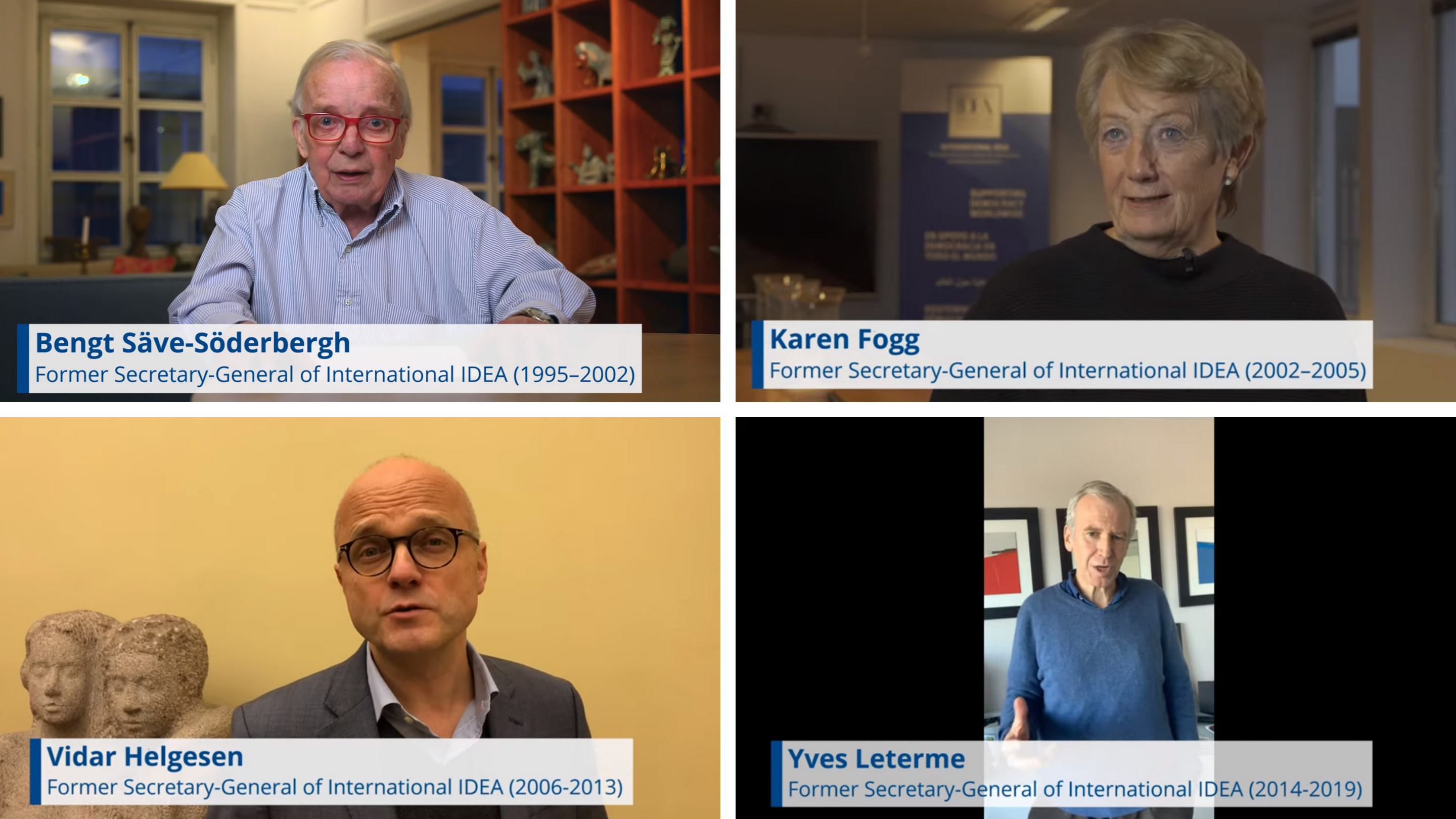
We had the pleasure to receive also different messages from former secretaries-general of International IDEA, they provided a historical perspective to the impact of the Institute´s work. Please, find their testimonies on our YouTube channel:
- Bengt Säve Söderbergh, Secretary-General of International IDEA (1995–2002)
- Karen Fogg, Secretary-General of International IDEA (2002–2005)
- Vidar Helgesen, Secretary-General of International IDEA (2006-2013)
- Yves Leterme, Secretary-General of International IDEA (2014-2019)
Member States'' representatives shared their messages of support and gratitude to International IDEA. The list of messages is available on YouTube and you can also see more testimonies of support at our 25th Anniversary site.
